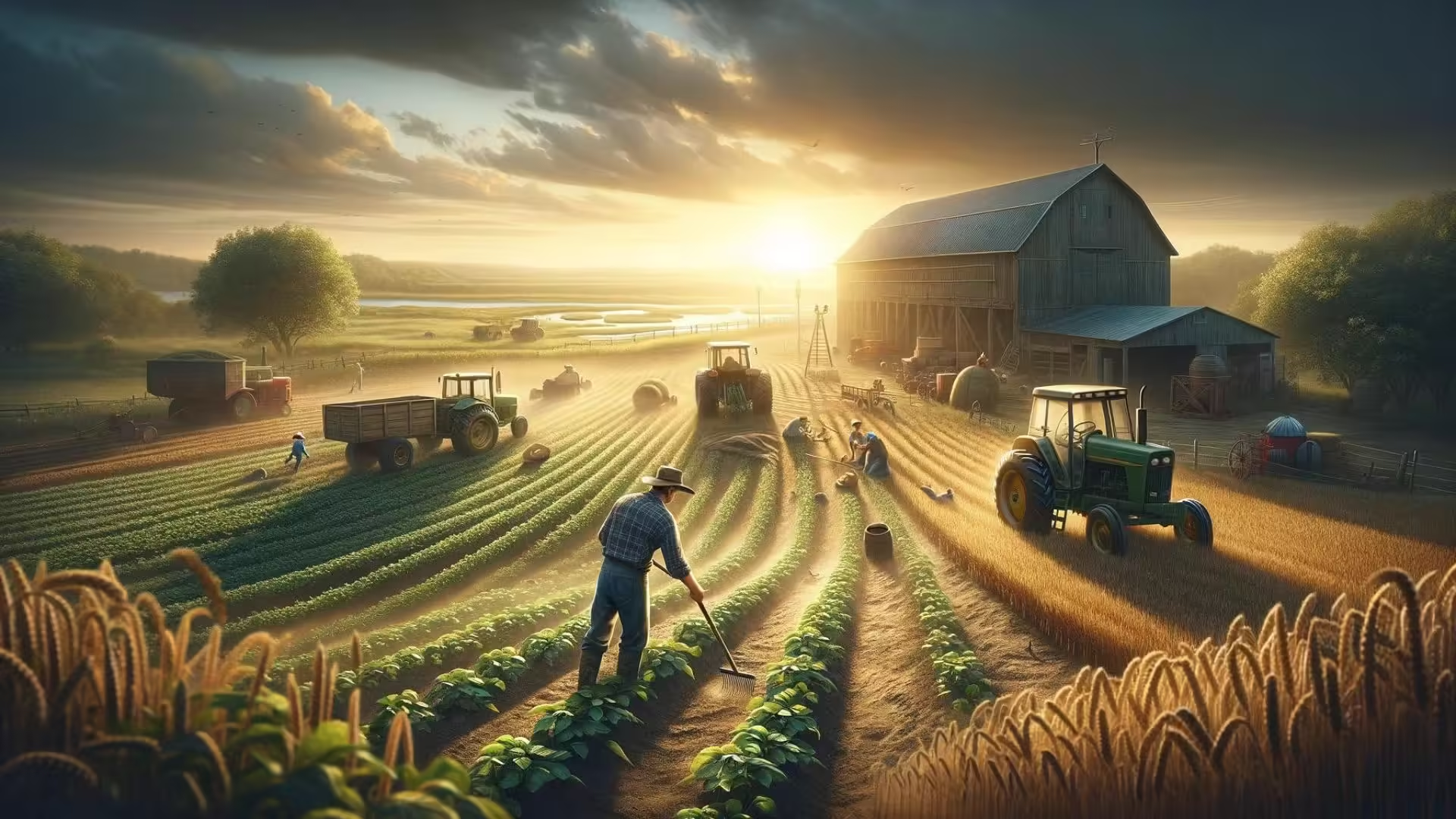The Challenging Yet Rewarding Life of a Farmer
Farming is one of the oldest and most essential professions, but it’s also one of the most challenging. While it may seem like a simple life from the outside—working with the land, tending to crops, and raising animals—being a farmer involves hard work, resilience, and a deep connection to the earth. Farmers play a critical role in feeding the world, yet they often face obstacles that test their resolve and commitment to the craft.
So, what does it take to be a farmer? And why, despite the difficulties, do so many people find farming to be a rewarding and fulfilling career? Let’s explore the reality of a farmer’s life, uncover its challenges, and understand the invaluable contributions farmers make to society.
The Everyday Challenges of Farming
Farming is much more than planting seeds and harvesting crops. It’s a career that requires a broad skill set, from understanding weather patterns and soil quality to managing finances and navigating fluctuating markets. Here are some of the key challenges farmers face:
- Unpredictable Weather
- Farmers are at the mercy of nature. Droughts, floods, frost, and storms can ruin crops, disrupt planting schedules, and lead to financial loss. Unlike other professions, farmers can’t control the environment in which they work, and a year’s worth of effort can be undone by a single unexpected weather event.
- Real-Life Example: Imagine working for an entire year only to have your biggest project destroyed by factors beyond your control. That’s the reality many farmers face when weather conditions turn against them.
- Financial Uncertainty
- Farming often operates on slim margins. The costs of seeds, equipment, labor, and maintaining land can add up quickly, while market prices for produce can fluctuate. A drop in crop prices or an increase in production costs can heavily impact a farmer’s livelihood. Additionally, farmers must invest in the long-term health of their land, which requires careful planning and sustainable practices.
- Real-Life Example: It’s like running a small business where you have to constantly balance expenses while competing with larger corporations, all while dealing with unpredictable market changes.
- Physical Labor and Long Hours
- Farming is physically demanding. From plowing fields and tending to animals to repairing machinery and building infrastructure, farmers often work from sunrise to sunset. The work is often repetitive, physically exhausting, and can take a toll on a farmer’s body over time. Despite advancements in technology, many tasks still require manual labor.
- Real-Life Example: Think about how tiring a day of physical labor can be—now imagine doing that every day, often seven days a week, with no breaks because the crops and animals depend on you.
- Access to Resources and Technology
- Farmers in many regions, especially smaller or family-run farms, may struggle with access to modern farming technology, water resources, or government support. While larger agribusinesses can invest in the latest innovations, many farmers are left to rely on traditional methods, which can be less efficient and more labor-intensive.
- Real-Life Example: It’s like trying to run a business with outdated tools while your competitors have access to cutting-edge technology that gives them a significant advantage.
Why Farming is Incredibly Rewarding
Despite these challenges, many farmers describe their work as deeply rewarding. There’s something unique about working with the land, nurturing life from seed to harvest, and providing food for communities. Here’s why farming is more than just a career—it’s a calling.
- Connection to Nature
- Farmers spend their days immersed in nature, working with the earth, plants, and animals. This connection to the natural world provides a deep sense of purpose and fulfillment. Many farmers speak of the satisfaction they feel watching their crops grow or caring for animals, knowing they are contributing to something bigger than themselves.
- Real-Life Example: In a world that’s becoming increasingly digital, farmers remain rooted in the tangible, natural world. Imagine the peace and pride of seeing the fruits of your labor literally grow before your eyes.
- Feeding the World
- Farmers play a vital role in sustaining life. They are the backbone of the food supply chain, growing the produce and raising the livestock that feed millions of people. There’s an immense sense of pride in knowing that your work directly impacts the well-being of others.
- Real-Life Example: Think about the last meal you enjoyed—chances are a farmer somewhere grew the ingredients. That connection to food makes farming one of the most essential and meaningful professions.
- Building Communities
- Farmers are often integral members of their local communities, providing not just food but also employment and a sense of stability. Small and family-run farms help support local economies, and the relationships built between farmers and consumers foster a strong sense of community.
- Real-Life Example: Consider the difference between buying produce from a large supermarket versus a local farmer’s market. The latter creates a direct connection between the people who grow food and the people who eat it, strengthening community bonds.
- A Life of Self-Reliance
- Farmers are often self-reliant, skilled in a variety of tasks from mechanics to biology. This independence is empowering, allowing farmers to take ownership of their land and their livelihood. There’s also a sense of freedom that comes from being your own boss and working on your terms.
- Real-Life Example: It’s like being the CEO, employee, and operations manager of your own company—handling everything from the business side to the day-to-day tasks on the ground.
Real-Life Lessons from Farmers
Farming isn’t just a job; it’s a way of life that teaches valuable lessons about resilience, patience, and adaptability. These lessons can be applied to almost any career or personal challenge.
- Patience: Crops don’t grow overnight, and neither do most of the goals we set in life. Just like farmers tend to their crops daily, we need to nurture our personal and professional goals with consistency and care.
- Adaptability: Farmers must adjust to changing weather, market conditions, and other factors beyond their control. This ability to adapt is key in any career or life path—being flexible can help you navigate unexpected challenges.
- Hard Work: Success in farming, as in life, requires dedication and hard work. There are no shortcuts, but the rewards of seeing your efforts pay off are worth it.
What You Can Do
The next time you sit down for a meal, take a moment to appreciate the farmers who made it possible. Consider supporting local farms by purchasing fresh produce from farmers’ markets or joining a community-supported agriculture (CSA) program. If you’re ever looking for a career that offers both challenge and reward, think about the life of a farmer and the essential role they play in our world.
In your own life, reflect on the lessons farmers teach us: patience, hard work, and adaptability. How can you apply these principles to your career or personal goals? Whether you’re facing a challenging project or navigating a big decision, embracing a farmer’s mindset may help you succeed.
Farming is a challenging, unpredictable, yet incredibly rewarding career that provides essential resources for society. How will you show your appreciation for the hard work farmers do, and how can their lessons inspire you to cultivate success in your own life?
Expand Your Vocabulary
- Resilience
- Meaning: The ability to recover quickly from difficulties; toughness.
- Everyday Use: Just like farmers must bounce back from unpredictable weather or market changes, resilience is key when you face personal setbacks, like overcoming challenges at work or in relationships.
- Livelihood
- Meaning: The means of securing the necessities of life, such as food and shelter.
- Everyday Use: Your livelihood is the job or business that provides for your basic needs, whether you’re a teacher, an entrepreneur, or a farmer.
- Self-Reliance
- Meaning: Dependence on one’s own abilities and resources rather than those of others.
- Everyday Use: Farmers often depend on their own skills to maintain their farms, much like we rely on ourselves to solve problems or accomplish goals in everyday life.
- Community-Supported Agriculture (CSA)
- Meaning: A system where consumers support local farms by purchasing shares of the farm’s harvest in advance.
- Everyday Use: Joining a CSA allows people to directly support local farmers and enjoy fresh, seasonal produce, much like subscribing to a service that delivers customized goods to your door.
- Sustainability
- Meaning: The ability to maintain or support something over the long term, often with a focus on environmental, economic, or social balance.
- Everyday Use: Making sustainable choices in your daily life, like reducing waste or conserving energy, helps ensure that future generations have access to the same resources we do.
- Adaptability
- Meaning: The ability to adjust to new conditions or challenges.
- Everyday Use: Farmers constantly adapt to changing weather and market conditions, just as we adapt to changes in our jobs, routines, or personal lives.
- Margins
- Meaning: The difference between the cost of producing something and the revenue it generates, often referring to profit margins in business.
- Everyday Use: Like farmers who work with thin margins due to fluctuating prices, businesses and individuals often need to carefully manage budgets to make sure they stay profitable or financially secure.
- Crop
- Meaning: Plants grown and harvested for food, fiber, or fuel.
- Everyday Use: While farmers harvest crops, we also tend to our personal “crops” in life, like nurturing a project or relationship until it bears fruit.
- Infrastructure
- Meaning: The basic physical and organizational structures needed for the operation of a society or enterprise.
- Everyday Use: Just as farms need infrastructure like irrigation systems and roads, businesses and homes need strong foundations to function effectively, such as technology, buildings, or social systems.
- Hard Work
- Meaning: A great deal of effort or endurance put into an activity.
- Everyday Use: Hard work is a common theme in all professions. Like farmers who spend long hours in the fields, achieving success in any area of life requires dedication and effort.
Let’s Talk
- Farmers face unpredictable weather and other challenges that they can’t control. In your own life, how do you handle situations where you have little control? What strategies help you stay resilient during tough times?
- Farming teaches the value of patience, as crops take time to grow. How do you practice patience in your personal or professional life? Are there long-term goals you’re working toward that require consistent effort over time?
- Farmers play a vital role in feeding communities. How can you support local farmers or contribute to your community in meaningful ways? Are there small changes you can make to be more connected to where your food comes from?
- Self-reliance is a key trait of farmers, as they often need to solve problems on their own. What are some areas of your life where you’ve had to be self-reliant? How did it shape your confidence and ability to handle challenges?
- Sustainability is essential for maintaining healthy farms and ecosystems. How can you incorporate sustainability into your daily life, whether through reducing waste, conserving energy, or supporting eco-friendly products?
- Hard work and dedication are necessary to run a successful farm. What areas of your life require hard work and perseverance? How do you stay motivated when things get tough?
Use these questions to reflect on how farming’s lessons apply to your own life. Share your thoughts with friends, family, or in the comments to spark meaningful conversations about the value of resilience, patience, and hard work.










0 Comments